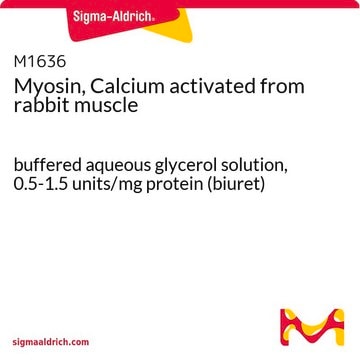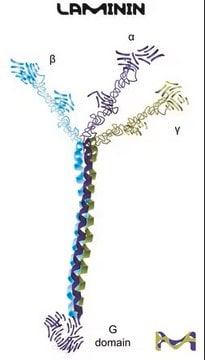T2400
Tropomyosin from porcine muscle
lyophilized powder (contains Tris buffer salts)
Se connecterpour consulter vos tarifs contractuels et ceux de votre entreprise/organisme
About This Item
Produits recommandés
Source biologique
Porcine muscle
Niveau de qualité
Pureté
≥70% protein basis (biuret)
Forme
lyophilized powder (contains Tris buffer salts)
Technique(s)
electrophoresis: suitable
Température de stockage
−20°C
Description générale
Tropomyosin is a member of the actin filament binding protein family. It is a ubiquitous protein present in animals and fungi. Tropomyosin is made up of two α-helical chains arranged as a coiled-coil. It exists over twenty isoforms, in different eukaryotic cells like skeletal, cardiac, and smooth muscles, brain, platelets, fibroblasts, platelets, and other non-muscle cells.
Application
Tropomyosin from porcine muscle has been used:
- as a positive control in actin- α-tropomyosin (TPM1) co-sedimentation analysis and assay
- in analyzing the anti-adhesive properties of fish tropomyosins
- in far Western blot analysis
Actions biochimiques/physiologiques
Tropomyosin is associated with the actin cytoskeleton and plays a role in stabilizing and regulating the interactions of actin with other actin-binding proteins. It also plays a role in muscle contraction by regulating the interactions of actin with myosin.
Tropomyosin together with troponin, regulates the binding of myosin to actin. Tropomyosin is a dimeric coiled-coil protein forming continuous polymers along the myosin-binding groove of actin. Various tropomyosin isoforms help confer structure and function to actins in the cytoskeleton and striated muscle function. Dimeric protein that assumes an α-helical coiled-coil conformation. In the absence of Ca2+, it inhibits muscle contractility by blocking the myosin binding sites on actin.
Remarque sur l'analyse
SDS electrophoresis shows two major bands.
Code de la classe de stockage
11 - Combustible Solids
Classe de danger pour l'eau (WGK)
WGK 3
Point d'éclair (°F)
Not applicable
Point d'éclair (°C)
Not applicable
Équipement de protection individuelle
Eyeshields, Gloves, type N95 (US)
Certificats d'analyse (COA)
Recherchez un Certificats d'analyse (COA) en saisissant le numéro de lot du produit. Les numéros de lot figurent sur l'étiquette du produit après les mots "Lot" ou "Batch".
Déjà en possession de ce produit ?
Retrouvez la documentation relative aux produits que vous avez récemment achetés dans la Bibliothèque de documents.
Vertebrate tropomyosin: distribution, properties and function
Perry S V, et al.
Journal of Muscle Research and Cell Motility, 5?49-5?49 (2001)
The molecular basis for tropomyosin isoform diversity
James P L M, et al.
Bioessays (1991)
A novel alpha-tropomyosin mutation associates with dilated and non-compaction cardiomyopathy and diminishes actin binding
Judith B A, et al.
Biochimica et Biophysica Acta - Molecular Cell Research, 1833(4), 833-839 (2013)
A systematic nomenclature for mammalian tropomyosin isoforms
Michael A G, et al.
Journal of Muscle Research and Cell Motility, 147?153-147?153 (2015)
G Reese et al.
International archives of allergy and immunology, 119(4), 247-258 (1999-09-04)
Among food allergens, crustaceans, such as shrimp, crab, crawfish and lobster, are a frequent cause of adverse food reactions in allergic individuals. The major allergen has been identified as the muscle protein tropomyosin. This molecule belongs to a family of
Notre équipe de scientifiques dispose d'une expérience dans tous les secteurs de la recherche, notamment en sciences de la vie, science des matériaux, synthèse chimique, chromatographie, analyse et dans de nombreux autres domaines..
Contacter notre Service technique







